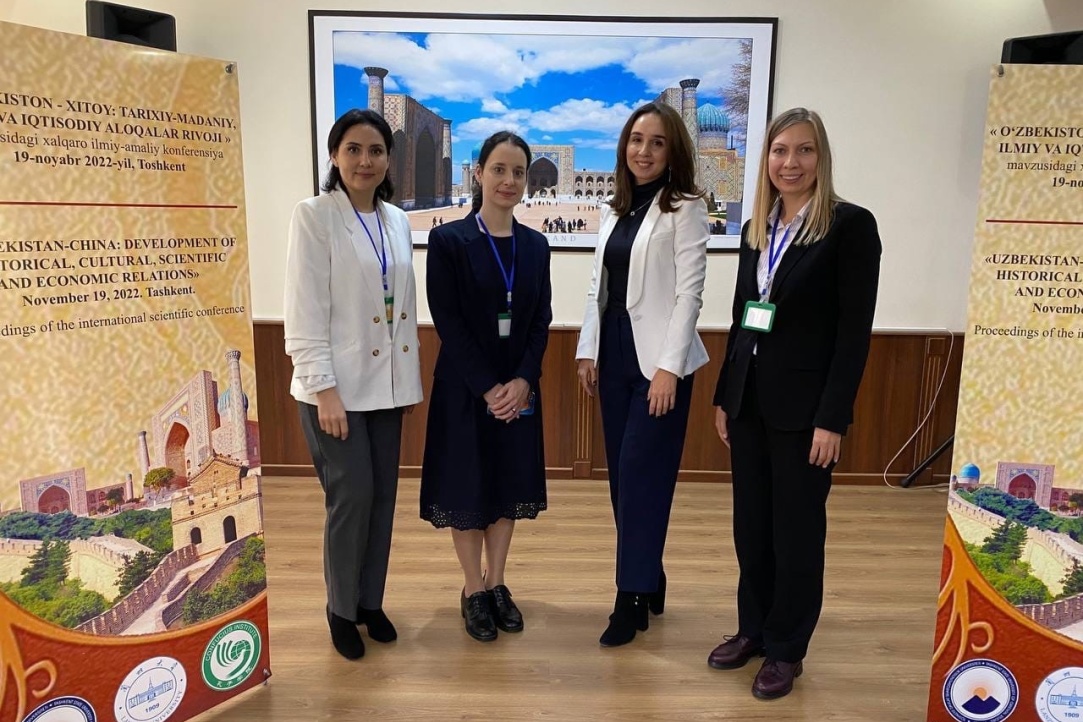Strengthening scientific ties with Uzbekistan
HSE professors took part in an international conference in Tashkent and held a number of guest lectures.

On November 17-22 the academic supervisor of the MA Programmes "Business and Politics in Modern Asia" and "International Business in the Asia-Pacific Region" Liudmila Veselova and Academic Supervisor of the MA Programme "Cross-Cultural Studies of Asia and Africa in the Context of International Relations" Alena Korobochkina in Uzbekistan. Colleagues visited two cities: Tashkent and Samarkand.
The purpose of the trip was to strengthen international relations between the universities of Russia and Uzbekistan, as well as to discuss further options for interaction. The working trip began from Tashkent - the capital of Uzbekistan and the largest city in the country. It is in Tashkent that the state authorities and the headquarters of most of the largest Uzbek commercial organizations are located. On the 18th November Veselova Liudmila and Korobochkin Alena teached guest lectures for undergraduate and graduate students of the Tashkent State University of Oriental Studies (TSUOS), and also talked about new MA Programmes at the Higher School of Economics. Since this academic year, TSUOS has been a partner of the National Research University Higher School of Economics and has been participating in academic student exchange programs, providing up to 10 places for HSE students during a semester.
On 19th November colleagues took part in the international conference “Uzbekistan-China: development of historical, cultural, scientific and economic relations” which was organized by TSUOS. The conference was held in 4 languages: Uzbek, Russian, English and Chinese. The conference discussed modern relations between China and Uzbekistan, the history of the development of economic and political ties, the development of Sinology in Uzbekistan, new methods of teaching Chinese, etc.
Prof. Veselova presented a report titled “Trademark Registration as a Mandatory Starting Point for Business in the PRC”, which identified the paramount need for trademark registration prior to launching a brand in the Chinese market. The topic is incredibly relevant for Uzbek entrepreneurs who are actively entering the Chinese market and are faced with the problems of copying brands and stealing intellectual property. On the example of Russian companies, Lyudmila Sergeevna showed that regardless of the status and recognition of the company and brand, it can become a victim of theft of intellectual property rights.
Prof. Korobochkina presented a report on the topic “Japan's assessment of China's activities and influence on the countries of Central Asia”. During the report, the evolution of the views of the academic circles of Japan on the activities of one of the largest actors in the countries of Central Asia, China, was demonstrated. Particular attention deserved the last, only emerging stage, characterized by increased interaction between China and Russia, in particular, within the framework of the Shanghai Cooperation Organization, and the loss of Japan's influence in the region.
It should be admitted that other HSE lecturers were also able to take part in the conference, using the mixed format of the conference. Prof. Morozova Valentina presented online with a report “Interactive online platforms in the practice of teaching Chinese: linguacultural and activity approaches” and Prof. Soboleva with a report on the topic “Decentralization of foreign policy-making process in the PRC and its implication for China’s Central Asia policy”.
Prof. Veselovf and Prof. Korobochkin also visited Samarkand, where they held a number of events together with Samarkand State University (SamSU). In recent years, Samarkand has become the venue for many international political and economic events. No wonder, because Samarkand is one of the ancient cities not only in Uzbekistan, but throughout the world. Like Tashkent, the city was located on the territory of the Great Silk Road and was also one of the main centers of science in the medieval East.
Prof. Veselova and Prof. Korobochkin conducted guest lectures, explaining undergraduate, graduate and postgraduate students about the features of talent management in China and the changing status of women in China's economic life, about the development of Russian-Chinese relations in Central Asia from the position of Japan, as well as about possible areas of cooperation between China and Japan in this region.
Several meetings were held with colleagues from Samarkand State University to discuss the further active development of relations between the two universities.
Liudmila S. Veselova
Associate Professor
Alena Korobochkina
Tutor
Valentina Morozova
Professor
Elena Soboleva
Associate Professor

